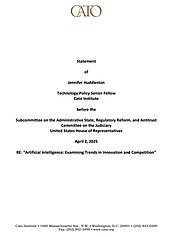Chair Fitzgerald, Ranking Nadler, and distinguished members of the House Judiciary Committee, Subcommittee on the Administrative State, Regulatory Reform, and Antitrust:
My name is Jennifer Huddleston, and I am a senior fellow in technology policy at the Cato Institute. My research focuses primarily on the intersection of law and technology, including issues related to antitrust and the governance of emerging technologies, such as artificial intelligence (AI). Therefore, I welcome the opportunity to submit a statement regarding the trends in innovation and competition related to this technology.
In this statement for the record, I will focus on three key points:
- While AI is not new, the AI industry is still in its infancy. It would be misguided to engage in antitrust action given that it is difficult to know how the industry and its players will evolve;
- The AI ecosystem is diverse and not monopolized when viewed as the interaction between various components both in its development and deployment;
- Misguided antitrust action and animosity towards leading technology companies could deter AI innovation and harm consumers.
AI Is a New Industry and First Movers and Innovators Should Not Be Confused for Monopolies
AI technology has been explored for a number of decades; however, the rapid explosion of AI products and particularly generative AI products for commercial and personal use is rather novel. The new AI industry is just beginning and we should not presume that it will resemble these early phases.
In some cases, existing leading technology companies have been dedicating resources to developing and implementing AI products for many years, both for standalone products as well as to improve existing resources.1 Other companies like OpenAI emerged as early movers with consumer-facing products. Still others, like chip company Nvidia, found that their products were in higher demand to support the growing AI ecosystem. But in all cases, the market definition is still highly amorphous and evolving along with AI products themselves.
Early leaders may appear to be successful because they are the first to offer a product or service desired by consumers. However, it is not yet clear if these early leaders will remain successful as the market evolves. Such has been the case before for the technology sector with headlines issuing concerns that companies like Nokia2, Yahoo3, and MySpace4 about the potential dominance or monopoly power in their respective markets only to be disrupted by more dynamic and innovative products along the way. The AI market today is like these headlines about early internet leaders, and we should take the same approach of allowing innovation to bring strong competition by keeping barriers low for entry, rather than presuming government intervention is necessary.
AI Should Be Understood as an Ecosystem Not a Single Product
AI is not a single product, but the result of a complex system of market interactions with various companies and components. This includes everything from the hardware to the development of models to the application of those models. At every stage of this ecosystem, there remains competition.5
Within this ecosystem, leading tech companies are competing with not only each other, but with innovators at startups and within other industries. As a result, even if a player is leading in one element of AI development their success will still face competition and constraints from leaders in other portions of the AI stack. Even those companies that are more vertically integrated will still face competition from those specialized in one segment of AI development. It is again too soon to know if a more integrated or specialized model is likely to yield the most market success and a diversity of business models is likely to benefit consumers with the most options to meet their specific needs.
Antitrust Intervention in AI Would Be Misguided
There have been calls on both the Left6 and the Right7 to engage in antitrust intervention in different elements of the AI ecosystem. This intervention would be misguided and could deter innovation and investment hampering the competitiveness of U.S. companies in the global market.
As discussed above, the current AI ecosystem appears to be competitive, with any dominance a result of natural innovation rather than anti-competitive practices. Antitrust intervention, even if unsuccessful, would devote resources away from important research and development to defending business actions during a critical phase in global competition. This would not be without consequences as we have seen from past antitrust cases resulting in a company missing potential opportunities to compete in emerging sectors.8
The US is not the only country seeking to develop AI and benefit from its applications. Calling successful leading companies monopolies could deter innovators and investors and provide adversaries like China who devote significant resources into their leaders in this important technology an advantage in the global marketplace. Furthermore, antitrust enforcement that is not based on the objective concerns of the consumer welfare standard and presumes existing leaders should not engage in new markets could deter leading companies from investing in or innovating in AI as has been seen in Europe.9
Instead of presuming success merits scrutiny, we should applaud early innovators and remember that disruptive innovations like AI are often our best competition policy.
Conclusion
Thank you for the opportunity to submit this statement. I welcome any further questions or the opportunity to further discuss my research related to issues of antitrust and artificial intelligence.

This work is licensed under a Creative Commons Attribution-NonCommercial-ShareAlike 4.0 International License.

